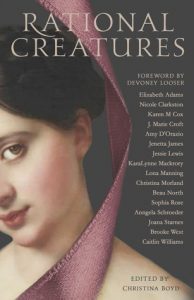 **This post originally appeared in 2022**
**This post originally appeared in 2022**
“But I hate to hear you talking so like a fine gentleman, and as if women were all fine ladies instead of rational creatures. We none of us expect to be in smooth water all our days.”
~Jane Austen’s Persuasion
How marvelous would it be to traipse through a world with all our favorite heroines from Jane Austen’s novels? To learn about their back stories, their futures, and maybe even a parallel event which isn’t mentioned in original canon? Christina Boyd of The Quill Ink had been ruminating on that very idea when she decided to make those woman and their stories come to life.
When she reached out to me and asked if I would participate, I was so honored to be asked to be a part of the project! For awhile I had wanted to write a short story about Charlotte Lucas’s plight, and was gearing up to do so, when instead I was given… Emma. Emma Woodhouse! The Emma Woodhouse who Jane Austen said no one would like but herself. I was almost undone!
I was not a studier of Emma, nor had ever really gotten through it with much joy or enthusiasm. My emotions for the project quickly changed from excitement to fear. Fear that readers would think I was a fraud because I hadn’t dissected Emma enough in my nerdy spare time to know all the little nuances of the book; fear that my story would be too juvenile; fear that I would fail. But, my courage often (not always) rises at every attempt to intimidate me, so I pulled myself up by the straps of my Hessians and began my story.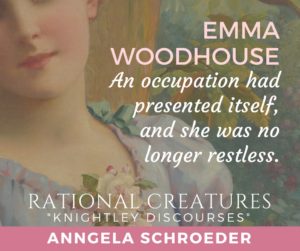
I wanted to show growth in Emma’s character; growth as a married woman. I’m not going to lie. Mr. Darcy is my favorite, but George Knightley is a close second. I wanted Emma to be worthy of him when I hadn’t been convinced she ever really was before. I began to consider their history. He had been attracted to her for numerous reasons, but I always felt her youthfulness held special attraction. True, Knightley would never marry a silly wife, but I’m sure there were other women who had crossed his path that would have fit the societal mold better than a sheltered girl from Highbury. And that’s when it hit me! Emma, who had to our knowledge felt only a slight inclination of jealousy with Harriet Smith’s feelings for Mr. Knightley, needed a bit more of a monkey wrench thrown in her path. Enter Rosalind Winthrop, a friend from Knightley’s youth.
And so the story begins most innocuously ten years after the Knightleys are married and shortly after the death of Mr. Woodhouse. Emma is bored and believes a matchmaking opportunity for Miss Bates of all people has presented itself, only to be turned on it ear. The title of my short story, Knightley Discourses, is almost exactly what it appears. Often in a marriage, the deepest dialogue happens at night as you are falling asleep. So, that’s when Emma and her Mr. Knightley enjoy the most uninterrupted conversation. Hence Knightley Discourses.
I would like to thank Editor Christina Boyd once again for the opportunity to have been a part of this amazing work. many of our Austen Variation authors were featured.
And now, please enjoy the following excerpt from the short story which forced me out of my P&P comfort zone and pushed me to write with more depth of character than I ever had before. In this bit, Miss Bates has just arrived for a short visit with Mrs. Knightley at Donwell Abbey, and has brought a letter from Mrs. Churchill (n’ee Jane Fairfax).
“And have you heard from Mrs. Churchill lately? I have longed to hear how young Master Churchill is faring with his newest pony.”
“Oh, yes. Oh, yes. It seems I have been running on with my thoughts.” Miss Bates reached for her reticule and began to dig through the bag. “You are so patient with me, Miss Woodhouse—forgive me. Mrs. Knightley. Yes, yes. I have actually received a letter from Jane this very day and knew you would long to hear it, as we have continued that tradition these many years.”
She then pulled the missive from her bag and held it up with a triumphant grin. “Ellen understands nothing about our dear Jane’s acceptance into the first circles by marrying Mr. Churchill, nor the deep affection he has for her, but you do. You witnessed it first-hand. And I have not even taken the time to read it myself. I was in such a happy state to share it with you, I came directly.”
Emma inhaled deeply and pasted a grin on her face, realizing how she would be forced to listen to her dear friend’s letter with likely the same news she herself had received in a letter only the day before.
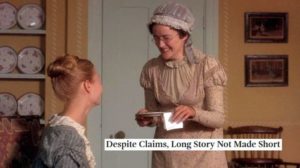 “Dear Aunt,” Miss Bates began. What followed, Emma could not recount, for she began to contemplate the fact that the maids needed to reach the corner beams of the room better to remove all the cobwebs (not just those at eye level), that the chair which sat nearest to the fireplace needed to be recovered, and that the chocolate biscuits Cook prepared for tea were the best she had in some time.
“Dear Aunt,” Miss Bates began. What followed, Emma could not recount, for she began to contemplate the fact that the maids needed to reach the corner beams of the room better to remove all the cobwebs (not just those at eye level), that the chair which sat nearest to the fireplace needed to be recovered, and that the chocolate biscuits Cook prepared for tea were the best she had in some time.
She was at the point of determining in her mind where to take the children on holiday, when her thoughts were brought back to the present by a small gasp from Miss Bates. The older woman’s cup shook as she picked it up and brought it to her lips
“Miss Bates, are you well? Was there anything in Jane’s letter which troubled you?”
“No, it is only…” She shook her head and set the cup down before beginning to fold up the letter. “It is just that I had no knowledge Jane and Frank were acquainted with the Winthrops.”
“Winthrop?”
“Forgive me, Mrs. Knightley. I must call for Ellen and return home before it gets too dark. I do not wish to travel through the woods as the sun is going down.”
Emma was shocked at the brevity of Miss Bates’ words and realized something had seriously distressed her.
“Miss Bates, please. I will order the carriage for you. You are our friend, and I would not wish to send you home with something troubling you.”
She watched as the older woman stood, sat, stood, looked at the folded letter, and sat again. “Miss Woodhouse. I thank you for the kindness and will accept your offer, but I must depart now.”
“Very well. Simmons,” she called to the footman at the door. “Have the groom prepare the carriage for Miss Bates. Notify me when it is ready to depart. Will you please see that Cook fills a basket with pork and pies as well as a basket of biscuits?”
“Yes, ma’am.” The young man nodded and left the room.
“Oh, Miss Woodhouse. You are so good to me.”
“It is nothing. I know how you adore sweets.”
A long silence hung between the two women before the clock finally chimed three bells, startling Miss Bates.
“Oh, Miss Woodhouse. My true intent of visiting you today was not solely to share Jane’s letter. I have recently been remembering my dear mother and, as she has been gone these several years, it made me think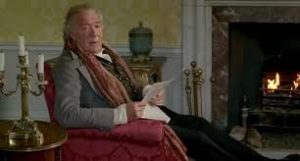 of you and our good friend, Mr. Woodhouse. I wanted to offer you my regards for him.”
of you and our good friend, Mr. Woodhouse. I wanted to offer you my regards for him.”
Emma was stunned how Miss Bates’ words for her father, whether providential or happenstance, seemed befitting her melancholy disposition of late, and she was at a loss of what to say. But she need not have concerned herself with an answer as Miss Bates continued:
“I was remembering that last dinner at Hartfield when both my mother and your father were still with us. It was Mr. Knightley’s birthday, do you recall? And he is so fond of cake and, as it was his birthday, your father agreed a very little might be an acceptable indulgence. Oh, and the cake. The most amazing concoction ever to be sure. And the butter cream! But then, to have mother die only three days later…quite possibly Mr. Woodhouse was correct in his estimation of rich foods?”
Before Emma could formulate an answer, the footman returned.
“The carriage is ready, ma’am.”
“Thank you, Simmons. Will you please collect Miss Bates’ maid from the kitchen?”
“Oh, bless you, Miss Woodhouse…I mean, Mrs. Knightly. Thank you.”
Emma took Miss Bates’s arm as the carriage was brought around and said, “I only wish you would confide in me if you are in need of solace, as you were a balm to my heart today. Time has not ceased the pain of my father’s passing, yet your words today dampened the sting.”
“Thank you to no end. You are always kindness itself.”
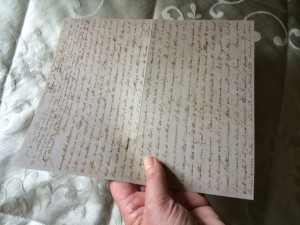 Returning to the drawing room, Emma rested her hand on the window as the small barouche drove down the lane towards Highbury. Why would a letter from Jane distress Miss Bates? And, most importantly, who is this Winthrop? Emma Knightley smiled. An occupation had presented itself, and she was no longer restless.
Returning to the drawing room, Emma rested her hand on the window as the small barouche drove down the lane towards Highbury. Why would a letter from Jane distress Miss Bates? And, most importantly, who is this Winthrop? Emma Knightley smiled. An occupation had presented itself, and she was no longer restless.
And so you have it, dear readers! Emma believes her boredom will soon be over. But, just as in the original, when she thinks she is in control of everyone’s destiny, she is forced to realize her scope of understanding is much more limited than she anticipated.
I hope you pick up a copy of Rational Creatures and discover the maturation of Emma Woodhouse, as well as the other Jane Austen characters delved into.

4 comments
Skip to comment form
Emma is not my favorite character although, Mr. Knightley is. This was a delightful walk down memory lane. I am tempted to reread this. Thanks for the reminder. Blessings on all your hard work.
Author
Thank you, J.W. 🙂
Loved this story so much, Anngela! You captured Emma’s voice perfectly!
thanks for the chapter. but still emma is my favorite character in the book.